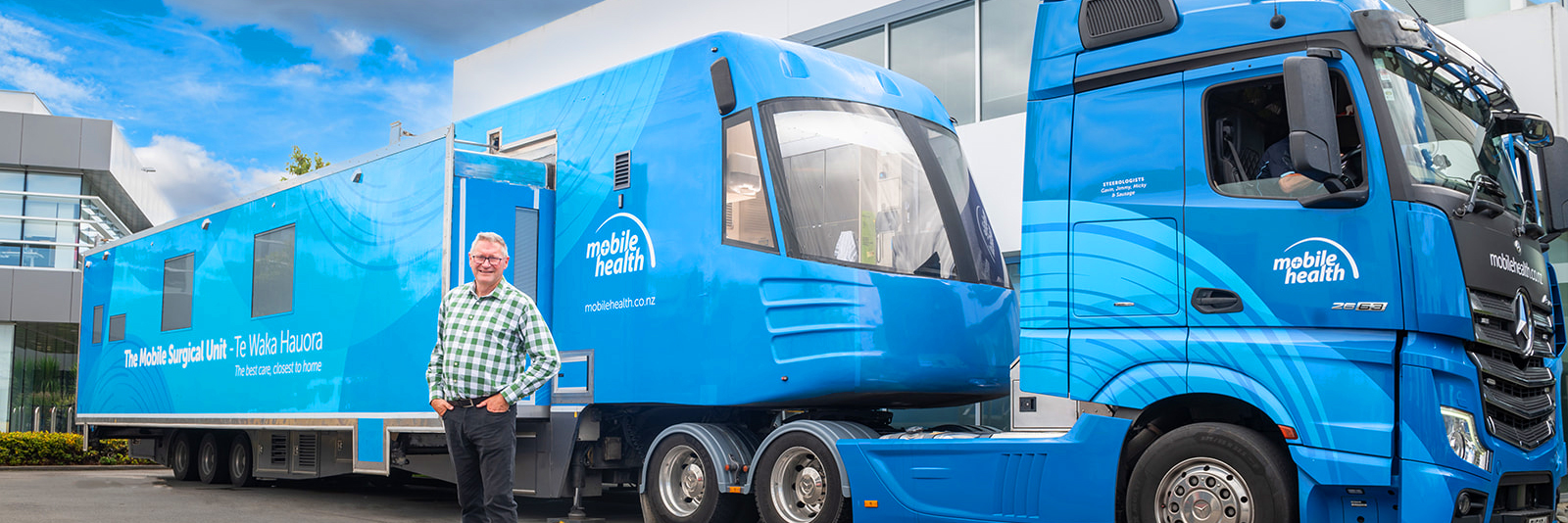
Solving problems: recycling vineyard posts
Fiona Terry reports on an innovative solution for re-purposing broken vineyard posts.

Sending people from rural communities to a centralised ‘big white hospital’ for low-risk medical procedures and day surgeries can create challenges for both the patient and their families. Not to mention the added pressure on an already stretched health system. So, why not flip the model?
The question formed part of a discussion among medical professionals more than 30 years ago and led to the creation of Mobile Health Group, a trio of trucks on an extraordinary mission to bring life-changing medical procedures to isolated Kiwi communities.

Rethinking the conventional ‘one size fits all’ approach makes sense on all accounts, says the group’s Chief Executive and former nurse Mark Eager.
“You don’t always need to go to a hospital for treatment. We were creating issues by sending everyone to a central place. There are a whole lot of services that can be delivered to communities around New Zealand if they’re well-coordinated, efficient and reliable, which we’ve proven to be,” he says.
“If you’ve got an expensive piece of technology that you don’t use every day, then make it mobile and share it. That’s the reason we exist.”
At first glance, the big blue units could be mistaken for any regular convoy of trucks servicing the regions of Aotearoa. But there’s nothing ordinary about the work of Mobile Health Group.

What began as the brainchild of urologist Dr Stuart Gowland three decades ago, a truck and trailer called the Lithotripsy Unit began travelling up and down the country for the non-invasive treatment of kidney stones.
A Surgical Unit joined in 2002 and another is expected next year. The truck is kitted with an entire operating theatre for low-risk, elective day surgeries including colonoscopies, gastroscopies and paediatric dental operations, which Mark says is an answer to the “nationwide health crisis” of unhealthy teeth and gums in children.
Today, these trucks have benefitted 50,000 patients from Dargaville to Gore.
More than 850,000 Kiwis live and work rurally. The privately owned units receive Ministry of Health funding to offer specialised services for these patients, treating them where they live and work while also creating opportunities for local medical staff.
“We bring the surgical units and the specialist staff like an anaesthetist, surgeon, charge and recovery nurses but we also utilise staff from the local town,” Mark says. “When the nursing staff are local, it becomes their service, not someone else coming in and taking over.”

For young patients, taking the ‘scary factor’ out of a procedure is something Mark also prides his team on. He recalls an instance in Hāwera, during a routine operation to insert grommets. “It was a nice sunny day. There was a group of mums with their kids playing under the poplar tree. That was the pre-admission area, and beneath the oak tree was recovery. Kids would come out from their operation a bit sleepy and wake up in mum’s arms under the tree. We had all the proper equipment, but it was a much nicer experience for everyone and not nearly as traumatic.”
That same ethos of caring for community is embedded within the Mobile Health Group’s own team, complete with gynaecologists, urologists – even ‘steerologists’ – the moniker given to the truck’s drivers.
There have also been times, like during the 2011 Christchurch earthquake, where the Mobile Health Units were commandeered as backup support.
“In the end, we weren’t needed in Canterbury, but we were there just in case. The trucks are a good thing to have in emergencies.” Mark recalls when Tīmaru Hospital closed all four of its theatres for maintenance: “We pulled up for four days and provided the only theatre in town, delivering nine babies via caesarean and an emergency hip replacement. It proved we can do everything we need to, a theatre’s a theatre.”
Mark hopes that the mobile health concept becomes more widely used. “We all know the health system is challenged. We need some innovation. There’s no reason why there couldn’t be a small fleet of units going to general practices in rural and regional areas and freeing up those big white hospitals. Ideally that’s the next step.”
Story by Monica Tischler for the Autumn 2025 issue of AA Directions Magazine. Monica Tischler is the Deputy Editor of AA Directions Magazine.